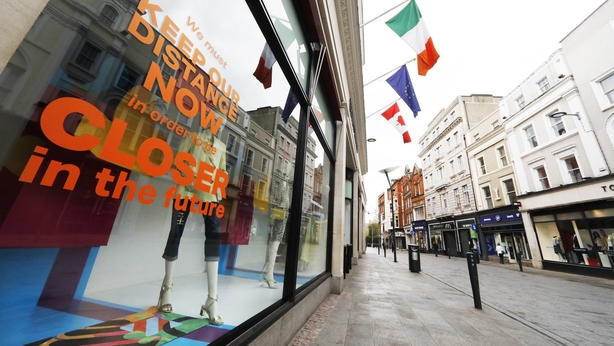The initial impact of Covid-19 on the Dublin economy is clearly evident with eight years of uninterrupted growth in the city's economy coming to an end, a new survey shows today.
The Dublin Economic Monitor, published by EY-DKM Economic Advisory on behalf of the four Dublin Local Authorities, mainly covers the first quarter of 2020 and captures the early part of the current economic contraction.
The economic hit looks set to accelerate in the second quarter when the full effects of the Covid-19 lock down become evident, the monitor suggests.
It found that the economic deterioration was particularly apparent in the Dublin hotel sector where April occupancy rates slumped by 57%, while average daily rates dropped by 30%.
Data from Dublin airport also reflects this with provisional numbers pointing to a 57% annual fall in March.
The Dublin Economic Monitor also shows that the broader business sector ground to a halt in the first quarter with the Markit PMI index falling into contractionary territory for the first time in over seven years.
It noted a 4.7% fall in volumes at Dublin Port in the first three months of the year, the largest fall since the third quarter of 2009.
This also looks set to accelerate in the three months from April to June with the new orders component of the PMI, a leading indicator, decreasing for the first time since 2012.
While the official Dublin unemployment rate only rose marginally to 4.6% in the first quarter, a sharp increase is expected in the second in line with the national Covid-adjusted unemployment rate, which rose to 28.2% in April.
David McNamara, Director with EY-DKM Economic Advisory, said that the first quarter of 2020 marked the end of nearly eight years of uninterrupted growth in the Dublin economy.

During those eight years unemployment in the city fell from a peak of 13.7% in 2012 to a trough of 4.5% in the fourth quarter of 2019 as the local economy boomed.
"The Covid-19 crisis has reversed much of this progress in a matter of weeks. Private sector employment was already contracting in the city in Q1, with worse to come in Q2. There are now question marks over the viability of many firms and jobs when emergency income supports are withdrawn," Mr McNamara said.
He said that as Ireland begins the slow process of re-opening the economy, attention will turn to the post-Covid landscape and what changes might occur from the crisis.
"As was the case in the aftermath of the last recession, Dublin should recover at a faster pace than the rest of the country due to its industry mix of domestic services firms and multinationals, but most forecasters are now discounting any prospect of a 'V-shaped' recovery," he said.
Mr McNamara predicted that jobs might be permanently lost in tourism and retail in the city, while a shift towards remote working in other sectors could change the way citizens travel and socialise in the city.

